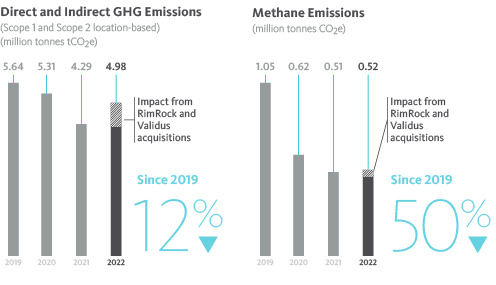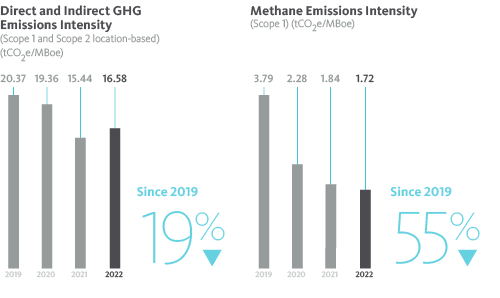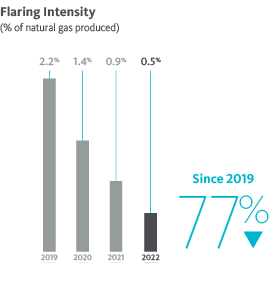Environment
Aiming for industry-leading performance
Devon is committed to doing what’s right for the environment. We want to be a good neighbor, a trusted partner and a responsible, competitive operator as we produce oil and natural gas to help meet global demand. We believe exemplary environmental performance is essential to managing risk and developing forward-looking business opportunities, with the aim of being successful throughout and beyond the energy transition.
To continuously improve our environmental performance, Devon is proactive and results-oriented. We consider the potential impacts of our operations when planning activities and making decisions. We strive to comply with all applicable environmental laws and regulations, often going above and beyond what’s required. In the process, we incorporate technology, tools and best practices to help minimize or avoid effects on air, water, land and wildlife.
Devon seeks to work with contractors who share our commitment to environmental stewardship. Our contractors must adequately train their personnel to perform environmentally sound work and have programs to comply with applicable environmental laws, rules and regulations. Contractors as well as employees have a responsibility to stop work to prevent spills or other environmental issues. Starting this year, contractors who perform work on Devon locations are required to complete annual assessments to help us evaluate their environmental, social and governance (ESG) performance in key areas.
Devon has established a track record of environmental performance improvements. To document progress on our long-standing priority to reduce our greenhouse gas (GHG) and methane emissions, we’ve responded to the CDP climate change survey for 19 consecutive years.
For almost two decades, we’ve been at the forefront of water conservation efforts in our industry. Devon takes great care to preserve biodiversity and protect wildlife habitat and cultural resources in areas surrounding our operations.
Transparency is important to our stakeholders and keeps us accountable for our results. Devon tracks specific metrics for GHG and methane emissions, flaring, spills, energy use, water use and others. We’ve consistently increased our disclosures in recent years and continue to share this information in this report and other public disclosures. For additional metrics and details on our environmental practices, please refer to our Climate Change Assessment Report and CDP responses.
TAKING ACTION
AIR
Reduced Scope 1 and Scope 2 location-based GHG emissions 12% and methane emissions 50% in 2022 compared to 2019.

Reduced Scope 1 and Scope 2 location-based GHG emissions intensity 19% and methane emissions intensity 55% in 2022 compared to 2019.

Note: Scope 1 and 2 GHG emissions and methane emissions increased in 2022 compared to 2021 primarily driven by the acquisition of RimRock and Validus, as well as an uptick in combustion-related emissions. Reduced flared volumes by 79% and flared volume intensity by 77% in 2022 compared to 2019.

Issued our updated 2023 Climate Change Assessment Report aligned with the Task Force on Climate-related Financial Disclosures (TCFD) recommendations.
Surpassed our standalone emissions reduction goal, which accounted for 15% of the overall corporate scorecard, based on flaring intensity performance and our enhanced leak detection program.
Joined the Oil & Gas Methane Partnership 2.0 (OGMP 2.0) and committed to its globally recognized, gold standard reporting framework.
Enhanced our leak detection and repair (LDAR) program by surveying 93% of production facilities with optical gas imaging cameras at least once during the year (with some facilities surveyed more than once), surveying 100% of our production facilities with aircraft flyovers at least twice during the year, and by installing continuous emissions monitoring on 31% of our production in 2022.
WATER
Used 72 million barrels of recycled water in 2022, an increase of 18% compared to 2021.
Since 2015, we have reused over 250 million barrels of water from our water treatment facilities.
BIODIVERSITY
Our enterprise-wide Reclamation Standard went into effect to reestablish biodiversity value consistently across the company with the goal of increasing native species diversity and richness in areas we once disturbed.
DEVON'S GOALS
Set 2023 standalone emissions reduction goal, which includes a year-over-year reduction in GHG intensity and a year-over-year reduction in our methane detection rate.
Driving alignment
Devon has a strong organization to manage environmental performance, from our board of directors to field-level environmental, health and safety (EHS) and operations teams. We’ve been bringing together our EHS and ESG core competencies and capabilities to drive alignment on our broader enterprise goals and objectives.
Our governance practices and organizational structure elevate EHS oversight and discussions, including those related to climate change and the energy transition. The board’s Governance, Environmental, and Public Policy (GEPP) Committee oversees environmental policies and performance and management’s efforts to integrate sustainability into our business activities. Through its role to nominate candidates for our board, the GEPP Committee establishes a close connection between corporate governance and sustainability. As a component of executive compensation, environmental results included in our corporate goals are reviewed by the board’s Compensation Committee. In addition, at least seven Devon directors have an educational background or direct work experience in environmental matters.
At the executive level, Devon’s executive vice president and chief operating officer (COO) is accountable for our environmental programs and performance. Our vice president of ESG and EHS reports to the COO. In early 2022, we established our standalone ESG team of subject matter experts on sustainability and ESG, led by the new role of ESG manager. The team provides advisory support across Devon to continue making progress in ESG and sustainability. They engage with shareholders, nongovernmental organizations (NGO), policy makers and other external stakeholders to enhance our understanding of ESG risks and opportunities. Working in tandem with our environmental and operations personnel, the ESG team helps guide strategies to achieve our decarbonization targets.
In addition, Devon is exploring energy transition opportunities complementary to our core business, including electrification, geothermal production, hydrogen development, carbon capture utilization and storage, produced water management, liquefied natural gas opportunities, low-carbon venture capital investments and strategic export opportunities to enhance the ultimate value of our production, among others. In 2022, we invested in a long-term LNG export partnership that creates additional pricing diversification for our natural gas portfolio and sustainable, capital-efficient returns for our shareholders. It also provides a much-needed source of additional supply to the global LNG marketplace. In 2023, Devon announced a strategic investment in Fervo Energy, a leader in next-generation geothermal technology. Fervo employs horizontal drilling, multi-stage well completion, and distributed fiber optic sensing to geothermal reservoir development. Given the synergies in operational practice and core competencies, this partnership underscores Devon’s commitment to creating value in the transition to an ever-cleaner energy economy.
As a result of our organizational efforts, environmental objectives and targets are considered in capital allocation decisions, corporate and business unit planning, and team strategies to operationalize emissions reductions into the way we do business.
Operations buy-in
The EHS Council, made up of Devon business unit and operations leaders, helps protect our social license to operate and advance our culture of environmental stewardship. The council sets environmental strategy and goals, tracks performance and evaluates the effectiveness of our environmental policies, protocols and practices. To continuously improve our performance, the group reviews environmental incidents and near misses, develops corrective actions as needed and shares best practices across Devon. Council members hold regular discussions with field production leaders to update them on rapidly evolving stakeholder expectations about climate change and environmental performance.
The Devon EHS Management System, developed by the council, includes an environmental management element to drive program improvements and assessments. Our environmental professionals work closely with Devon leaders to promote and implement environmentally sound operations that comply with applicable laws, regulations and company policies. Based on its assessment of Devon’s progress on the elements of our management system, the council is focusing on the asset integrity element in 2023 to enhance our overall environmental performance.
To position Devon for long-term success, the council reviews emerging EHS and ESG issues, as well as proposed laws and regulations and their potential financial, operational and reputational impact on the company.
The council drives industry-leading environmental performance by developing environmental goals that are approved by the board as part of our executive compensation formula. In 2022, we set goals to reduce flaring intensity and build out our enhanced leak detection and repair (LDAR) program. We surpassed our goal to reduce the amount of gas flared to 0.75% of gross natural gas produced by achieving a flaring intensity of 0.46%, excluding the recently acquired RimRock and Validus assets. Including our newly acquired assets, we achieved a flaring intensity of 0.51%, still outperforming our goal. In addition, we conducted optical gas imaging surveys at 93% of our facilities and surveyed 100% of production facilities with aircraft flyovers at least twice during the year. We also installed continuous or near-continuous emissions detection and monitoring equipment on 31% of our production.
In 2023, we’re maintaining our standalone emissions reduction goal for the second straight year. This year’s two-part compensation goal includes a reduction in our GHG emissions intensity and a reduction in our methane emissions detection rate. Together, these goals account for 15% of the company’s 2023 performance scorecard and are in response to stakeholder requests to tie Devon’s compensation directly to our targets. Our corporate goals and medium- and long-term goals challenge Devon to improve our environmental performance and hold us accountable for producing oil and natural gas in an environmentally responsible way.
| Environment Performance Metrics1 | |||
| *Unless otherwise noted, all data presented is pro forma (Devon + WPX) for U.S. operated assets. | |||
| 2020 | 2021 | 2022 | |
| Direct GHG Emissions (Scope 1) (million tonnes CO2e)2 | 4.98 |
|
|
| By Constituent | |||
| Carbon Dioxide (million tonnes CO2e) | 4.36 | 3.44 |
|
| Methane (million tonnes CO2e) | 0.62 | 0.51 |
|
| Nitrous Oxide (million tonnes CO2e) | 0.003 | 0.002 |
|
| By Source | |||
| Flaring/Venting (million tonnes CO2e) | 2.99 | 2.32 | 1.88 |
| Combustion (million tonnes CO2e) | 1.95 | 1.60 | 2.69 |
| Other (million tonnes CO2e) | 0.04 | 0.03 | 0.02 |
| Indirect GHG Emissions from Electricity Use (Scope 2 location-based) (million tonnes CO2e)3 | 0.32 |
|
|
| Direct and Indirect GHG Emissions (Scope 1 and Scope 2 location-based) (million tonnes CO2e)2,3 | 5.31 | 4.29 |
|
| Scope 1 and 2 GHG emissions and methane emissions increased in 2022 compared to 2021, primarily driven by the acquisition of RimRock and Validus, as well as an uptick in combustion-related emissions. | |||
| Direct GHG Emissions Intensity (Scope 1) (tCO2e/MBoe)2 | 18.19 | 14.22 |
|
| Direct and Indirect GHG Emissions Intensity (Scope 1 and Scope 2 location-based) (tCO2e/MBoe)2 | 19.36 | 15.44 |
|
| Indirect GHG Emissions from Use of Sold Products (Scope 3, Category 11) (million tonnes CO2e)4,5 | 49 | 84 | 90 |
| We report indirect emissions from the use of sold products on an equity basis from sources not owned or controlled by Devon; however, it is important to note that Scope 3 emissions estimates are subject to uncertainty, inconsistency and duplication as further described in the Air Emissions section of this report. 2020 estimated Scope 3 emissions are legacy Devon only, while 2021 and 2022 reflects pro-forma Devon + WPX. | |||
| Methane Emissions Intensity (Scope 1) (tCO2e/MBoe)2 | 2.28 | 1.84 |
|
| Methane Emissions Intensity - Production Segment (Scope 1) (% of natural gas produced)6 | 0.23% | 0.20% | 0.19% |
| Flared Volume (Bcf) | 12.3 | 6.4 | 3.8 |
| Flaring Intensity (% of natural gas produced)7 | 1.43% | 0.93% |
|
| Energy Used - Fuel and Electricity Use (trillion BTU)3 | 31.36 | 27.18 | 43.03 |
| Water Usage (million Bbl)8 | 98 | 116 | 126 |
| Recycled (million Bbl) | 37 | 61 | 72 |
| Sourced (million Bbl) | 61 | 54 | 54 |
| Fresh (million Bbl) - Newly Reported in 2022 | --- | --- | 9 |
| Water Usage Intensity (Bbl/Boe produced)8 | 0.32 | 0.42 | 0.44 |
| Water Usage Intensity (million Bbl/well completion)8 | 0.29 | 0.37 | 0.35 |
| Water Recycle Rate (recycled water Bbl/water usage Bbl)8 | 38% | 53% | 57% |
| Devon's total water use for completions activities varies with activity levels, targeted formations and lateral lengths, and includes fresh, non-fresh and recycled water volumes. We seek alternatives to freshwater supplies, where possible. | |||
| Reportable Spill Events Released to the Environment (events) | 246 | 280 | 413 |
| Reportable Spill Volumes Released to the Environment (barrels) | 4,042 | 5,705 | 10,858 |
| 1 The environment metrics have been calculated using the best available data at the time of publication. Historical metrics are subject to change as we continuously seek to improve our data management practices, data sources and calculation methodologies in order to provide the highest level of transparency, consistency and accuracy. We report environment metrics on an operated basis, unless otherwise noted. | |||
| 2 We include all reportable emissions under EPA's Greenhouse Gas Reporting Program (GHGRP) for Devon operated facilities, as well as non-reportable emissions from our production assets and, beginning in reporting year 2019, gathering and boosting assets. We calculate emissions intensities using gross production as reported under the EPA GHGRP for all reporting segments. Prior year data has been revised to include an additional category of emissions that was not previously reported. | |||
| 3 We calculate our Indirect GHG Emissions from Electricity Use (Scope 2) on a location-based methodology using EPA fuel and electricity emissions factors. | |||
| 4 We report indirect emissions from the use of sold products (Scope 3) on an equity basis from sources not owned or controlled by Devon. To estimate our Scope 3 emissions, we rely upon IPIECA’s 2016 guidance document Estimating Petroleum Industry Value Chain (Scope 3) Greenhouse Gas Emissions. Per the IPIECA guidance, we report category 11 “Use of Sold Products” by calculating combustion emissions for our oil, natural gas and marketed natural gas liquids products using emissions factors obtained from the EPA and net equity production reported in Devon’s 2022 Annual Report on Form 10-K. | |||
| 5 Performance is limited to legacy Devon performance only in 2020 and pro-forma Devon + WPX in 2021 and 2022, using net equity production reported in Devon's 2022 Annual Report on Form 10-K for all three years. | |||
| 6 Our methane emissions intensity rate calculation includes all natural gas produced at Devon operated facilities and all methane emissions from Devon operated facilities associated with the production of oil and natural gas. | |||
| Click here to see Devon's calculation methodology for methane emissions intensity | |||
| 7 Our flaring intensity rate calculation includes high-pressure flared volumes associated with the production of oil and natural gas. | |||
|
|
|||
| ERM CVS provided limited assurance in relation to Devon’s Total Scope 1 GHG emissions and Total Scope 2 GHG emissions (location-based method) for the reporting period January 1, 2021 to December 31, 2021. Due to subsequent revision of 2021 GHG emissions data owing to calculation refinements that are more representative of some aspects of our operations by including an additional category of emissions, ERM CVS has reassured the revised data for reporting year 2021. For reporting period January 1, 2022 to December 31, 2022, we expanded the scope of the limited assurance to include individual GHG constituents (i.e., carbon dioxide, methane and nitrous oxide), GHG emissions intensity, methane emissions intensity and flaring intensity. | |||
| Basis of Reporting GHG Emissions | |||
| Independent Assurance Statement | |||
